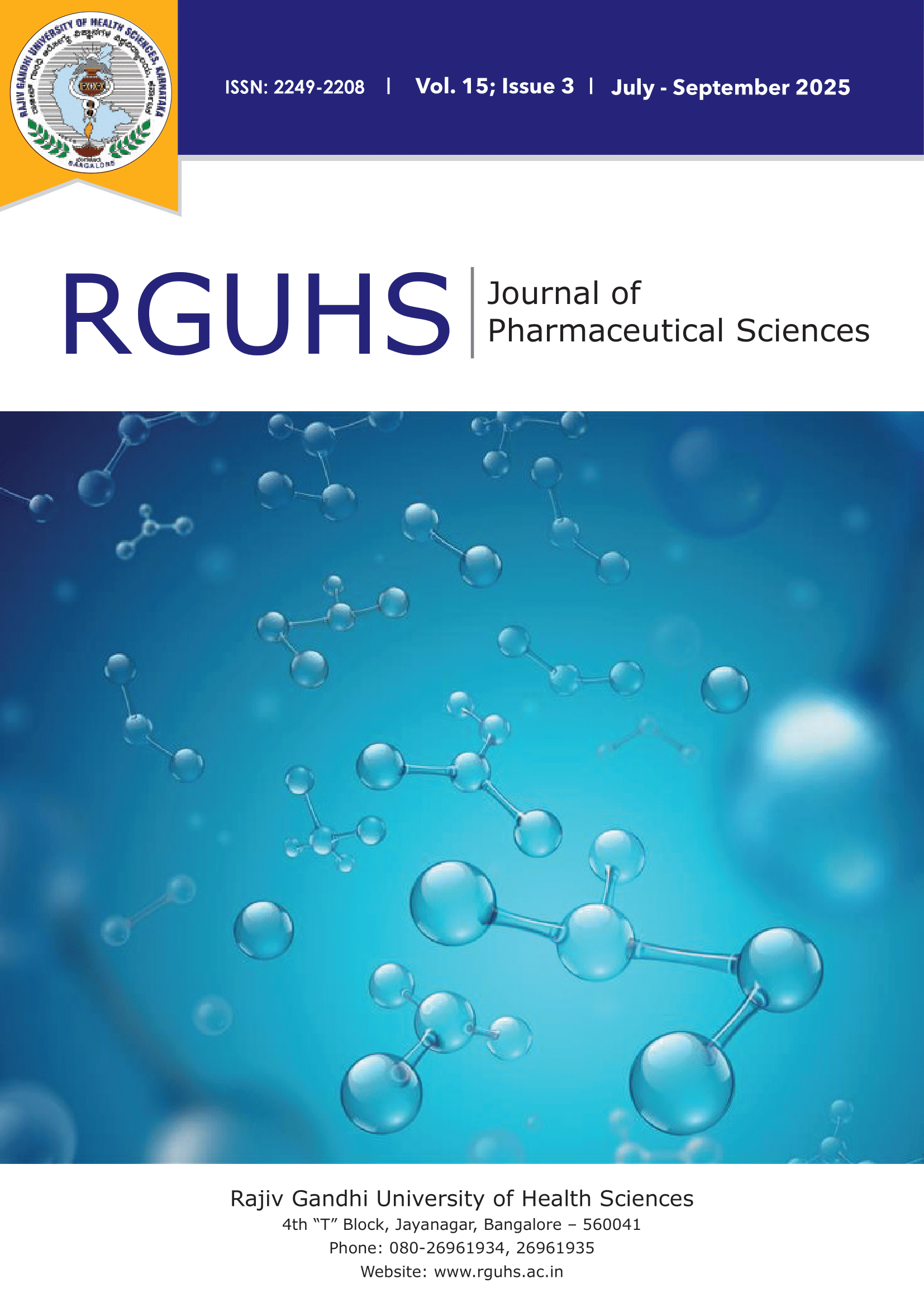
RJPS Vol No: 15 Issue No: 3 eISSN: pISSN:2249-2208
Dear Authors,
We invite you to watch this comprehensive video guide on the process of submitting your article online. This video will provide you with step-by-step instructions to ensure a smooth and successful submission.
Thank you for your attention and cooperation.
Dr. Raju Koneri
M.Pharm.Ph.D. Editor-in-Chief, RJPS, Dean, MVM College of Pharmacy, Bangalore. E-mail: rguhsjps19@gmail.com

Abstract
None
Keywords
Downloads
-
1FullTextPDF
Article
Most of our academic research in Postgraduate institutes does not have any translational values. As a result, our graduates do not have a dream to convert their research into a product that can benefit mankind. Most of our research centers have never filed a patent. This trend is contrary to the thinking of colleges in developed nations. The government of India has been taking important measures to promote translational research
Some initiatives on Translational Research (TR) taken by various scientific and biomedical funding agencies of the Government of India (GoI) are as follows,
1. The Department of Biotechnology (DBT), Ministry of Science and Technology (MoST), GoI, took an initiative to establish an autonomous institution named Translational Health Science and Technology Institute in 2010. Initially, the aim of this institution was to promote fundamental research with a multidisciplinary approach. The focus was on translating the identified leads to scientific and technological prototypes and promoting innovations and patents by transforming the scientific leads for improvement in the healthcare system. The ultimate objective is to develop new strategies for the diagnosis and management of diseases. These programs will help in creation of an inter-institutional ecosystem in the Biotech Science Cluster, focused on the development of an academia-biotech-industry collaboration within major innovation hubs.
2. The Biotechnology Industry Research Assistance Council (BIRAC) is a not-for-profit Public Sector Enterprise, set up by the DBT, MoST, and GoI. The initiative of BIRAC is mainly focused to encourage and empower the emerging biotech industries in the Indian continent. The modus operandi is still being developed for funding; focusing more on targeted funding, IP management, technology transfer, and partnership schemes that help bring innovation excellence to Indian biotech firms and strengthens them to get global recognition. BIRAC has provided financial and mentoring support to more than 500 companies and nearly 500 young entrepreneurs or start-ups. It has initiated partnerships with several national and global networks, including more than 15 implementing agencies. In addition, nearly 700 national experts from academia, industry, public and private research laboratories, donor agencies, and other government departments have been working hand in hand to contribute towards building the innovation ecosystem of India
3. Standford India Biodesign (SIB) program started in 2007 and continued till 2014. SIB is an innovation program implemented by DBT, All India Institute of Medical Sciences (AIIMS), New Delhi, and Indian Institute of Technology, Delhi (IITD), in collaboration with Queensland University of Technology, Australia, and Hiroshima University, Japan. For the implementation of this program, DBT has engaged the Biotechnology Consortium of India Limited to manage the techno-legal activities. The mandate of this program is to train the next generation of medical technology innovators in India. The focus is on invention/innovation and early-stage development of affordable, accessible, and available medical technologies for the Indian population. During the last decade since its inception, this interdisciplinary program has plotted some landmark achievements; trained more than 100 medical technology innovators (doctors, engineers, designers, juvenile entrepreneurs); more than 50 prototypes have been developed so far which have been further refined and validated internationally and tested [both preclinical and clinical trials (CTs)]; more than 50 medical devices developed by young innovators from IITD and faculty of AIIMS have been patented; 15 technologies have been transferred and nine medical technology have been sync with the Start-up India program.
4. Apart from basic biomedical research, the Central Drug Standard Control Organization (CDSCO), India, is also trying to reform rules for approval of investigational new drugs, innovations, new interventions, CTs, and new medical devices as per the current requirements. Multinational companies are introducing their medical devices by tailoring their product portfolio to the Indian market needs to reduce out-of-pocket expenditure for patients. RGUHS’s advanced research department has been giving research grants since 2014. The main objective of this grant is to promote translational research in our affiliated colleges. RGUHS desires that the teachers make use of various opportunities and engage themselves in Translational Research.
Supporting File
References
None